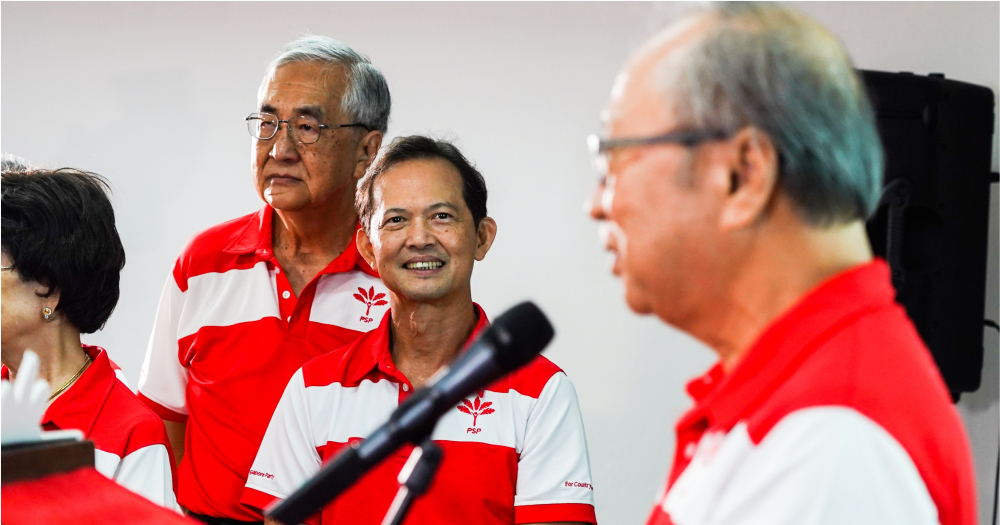The Progress Singapore Party (PSP) assistant secretary-general Leong Mun Wai has revealed to The Straits Times on March 18 that the party is set to make its presence felt in the upcoming election with a "sizeable contingent".
The party has outlined its plan to its 60 members in last evening and Leong spoke to ST afterwards about the party's strategy for General Election 2020.
ST reported that PSP has identified 44 candidates and 13 in reserve.
The party reportedly aims to contest in 15 constituencies (eight GRCs and seven SMCs) with its secretary-general Tan Cheng Bock set to contest in five-member West Coast GRC.
Leong also hopes to seek the "cooperation" of all other opposition parties to come to an "amicable arrangement".
However, Leong added that they will still need to discuss with other parties before finalising the plan.
So what does this actually mean for PSP in the GE 2020? Here are three observations should PSP stick to this game plan.
1. PSP aims to be the biggest opposition party contesting the PAP in its first outing
In the last GE, Workers' Party, seen by many as Singapore's largest opposition party, has contested 28 seats, focusing on five GRCs & 5 SMCs.
In contrast, the PSP told The Straits Times that it has 44 candidates, which means that it is likely to contest in at least 44 seats.
This is one and a half times more than WP's 2015 outing.
2. PSP trying not to engage in a three cornered fight with the two main opposition parties, WP and SDP, if possible
According to The Straits Times, PSP has set an ambitious target of contesting 15 constituencies:
Jurong GRC, Chua Chu Kang GRC, Tanjong Pagar GRC, Jalan Besar GRC, Bishan-Toa Payoh GRC, Nee Soon GRC, Sembawang GRC, Hong Kah North SMC, Yuhua SMC, Pioneer SMC, Radin Mas SMC, Kebun Baru SMC, Marymount SMC and Yio Chu Kang SMC.
What is missing in the constituencies PSP is contesting are the strongholds of WP. For instance, PSP is not contesting in WP-held Aljunied GRC and Hougang SMC.
PSP is also not aiming at WP's battlegrounds of East Coast GRC, Marine Parade GRC and MacPherson SMC.
Neither is PSP eyeing the newly created Sengkang GRC that has absorbed both previously WP-contested SMCs of Punggol East and Sengkang West.
However, PSP is contesting in previously WP contested areas like Nee Soon GRC and Jalan Besar GRC.
On the Singapore Democratic Party (SDP), PSP is not contesting in previously contested SDP's battlegrounds of Bukit Batok SMC, Holland Bukit-Timah GRC and Marsiling-Yew Tee GRC.
But PSP is eyeing previously SDP contested areas such as Yuhua SMC.
This means that while PSP is aiming not to be antagonistic towards WP and SDP in competing in seats that they have clearly cultivated over the years, they are also holding some cards for further negotiation by being the first to "chope" a few WP and SDP areas.
3. PSP adopting a by-election strategy?
With 93 members of parliament to be returned, is PSP adopting a by-election strategy?
The by-election strategy was famously associated with veteran opposition member of parliament Chiam See Tong in the 1990s.
In the First Wave: JBJ, Chiam & The Opposition in Singapore, author Loke Hoe Yeong, wrote that Chiam was not the first opposition candidate to think of this idea, even though he became the public face of the strategy.
"He was not only seen as the architect of the strategy, but was also the only figure in the SDP with the moral authority around whom support for the idea could be galvanised. First Wave: JBJ, Chiam & The Opposition in Singapore, 2019, p.179"
The idea is that the vast majority of Singaporeans wanted more of an opposition presence in Parliament but did not want an opposition government.
Hence, the aim is to allow Singaporeans to vote for enough opposition but leave parliament seats uncontested or won by the ruling People's Action Party (PAP) so that they will be returned to power no matter what.
PSP's current strategy would mean that if it won all 44 seats, it will not be the government of the day, as long as the PAP wins the other 49 seats.
In other words, PSP's strategy may be to ask voters to prioritise PAP and PSP in the upcoming GE, instead of going with other opposition parties that are unable to muster enough national support.
Top photo by Rachel Ng
If you like what you read, follow us on Facebook, Instagram, Twitter and Telegram to get the latest updates.
